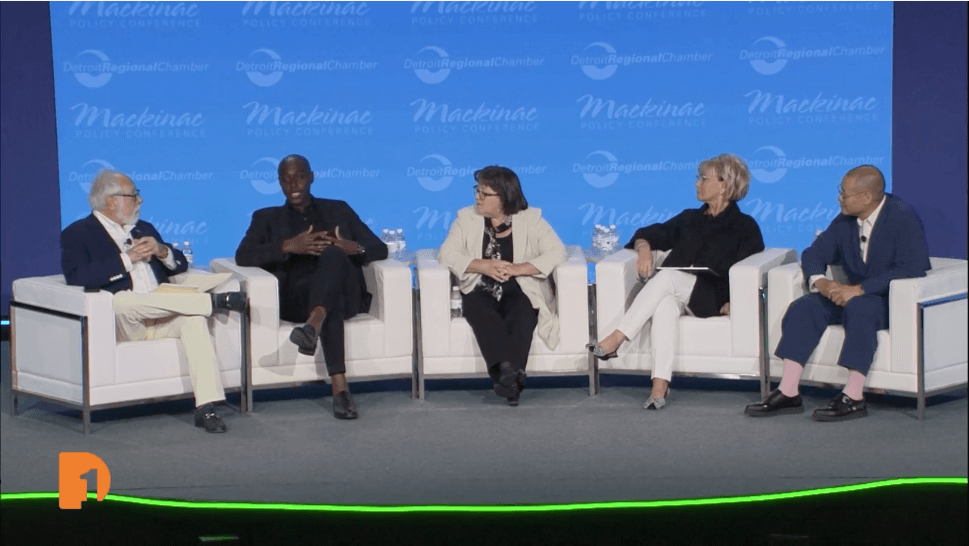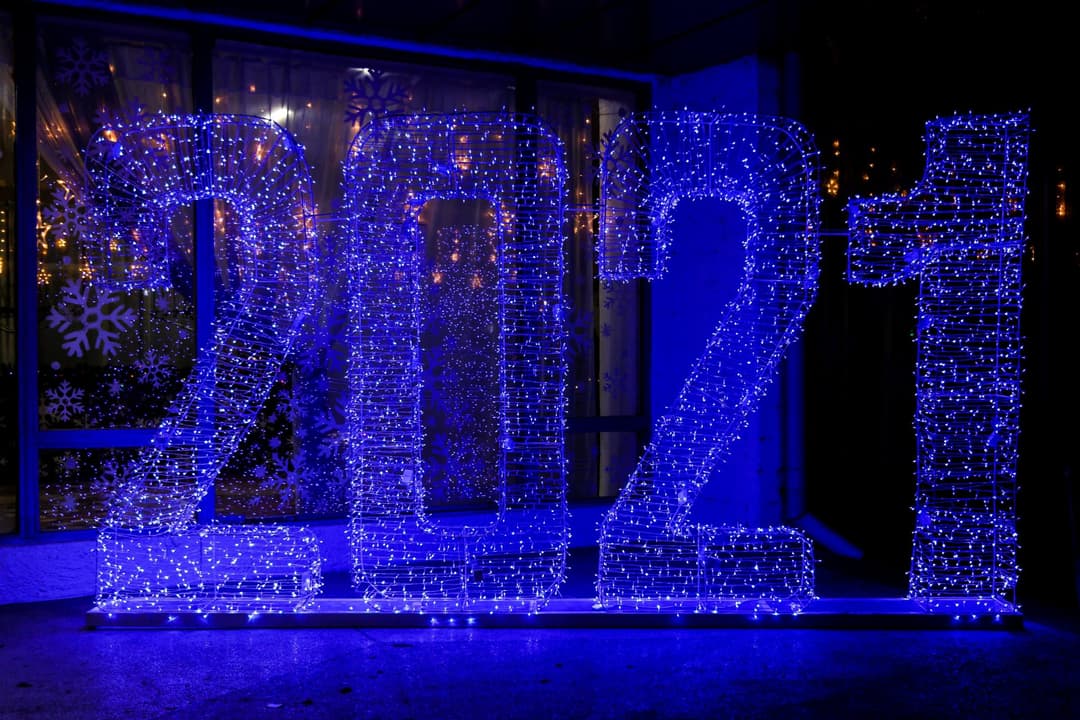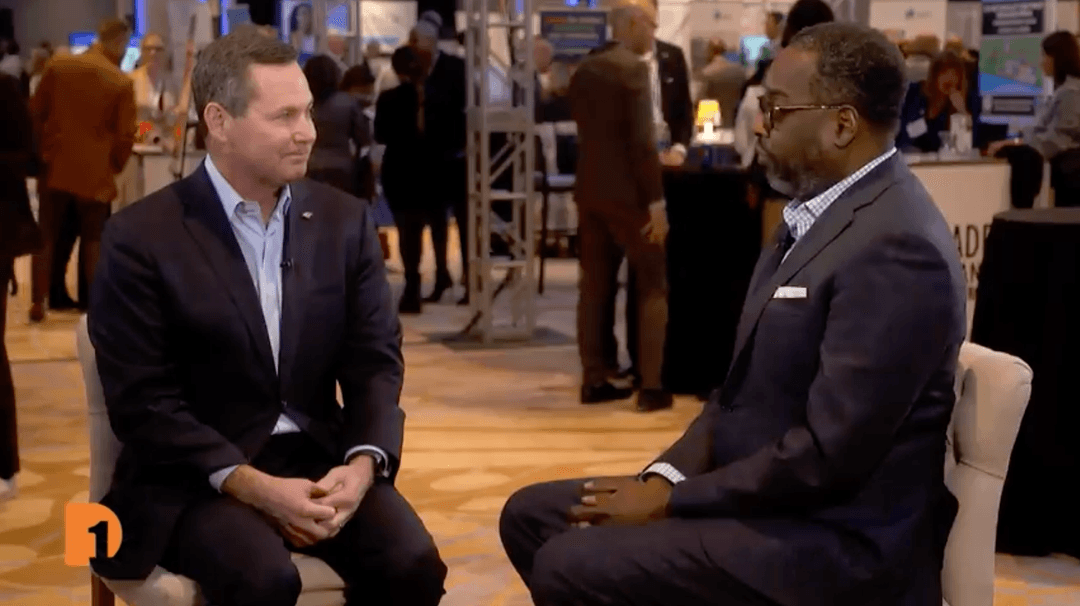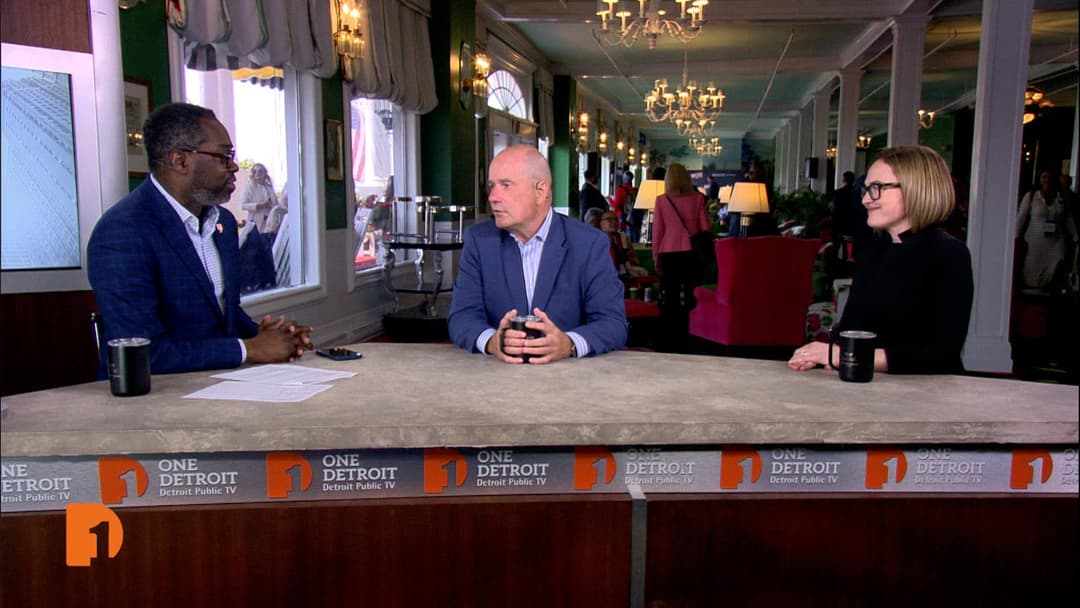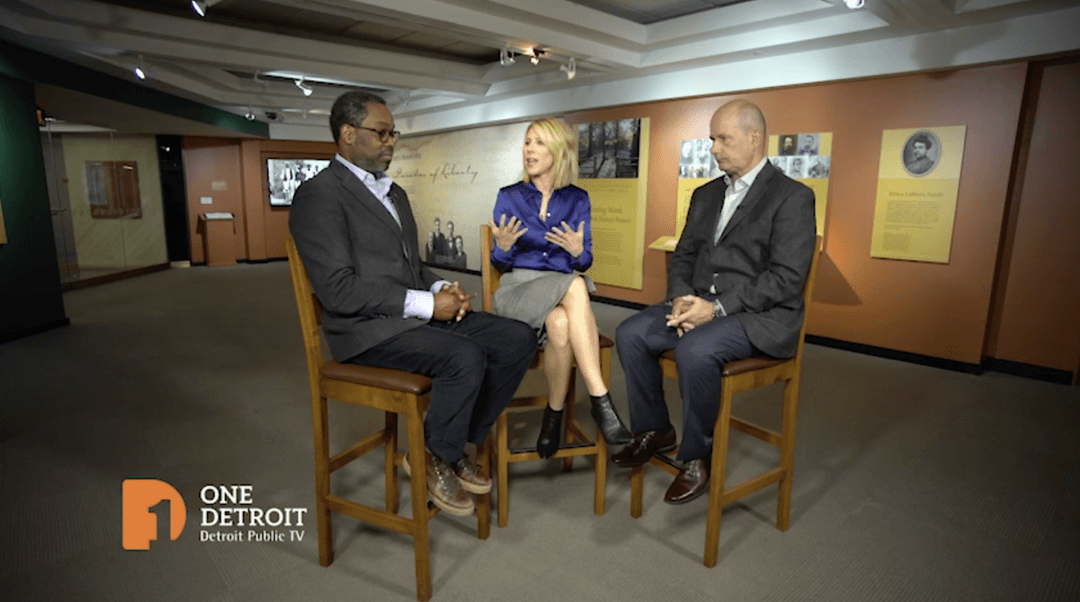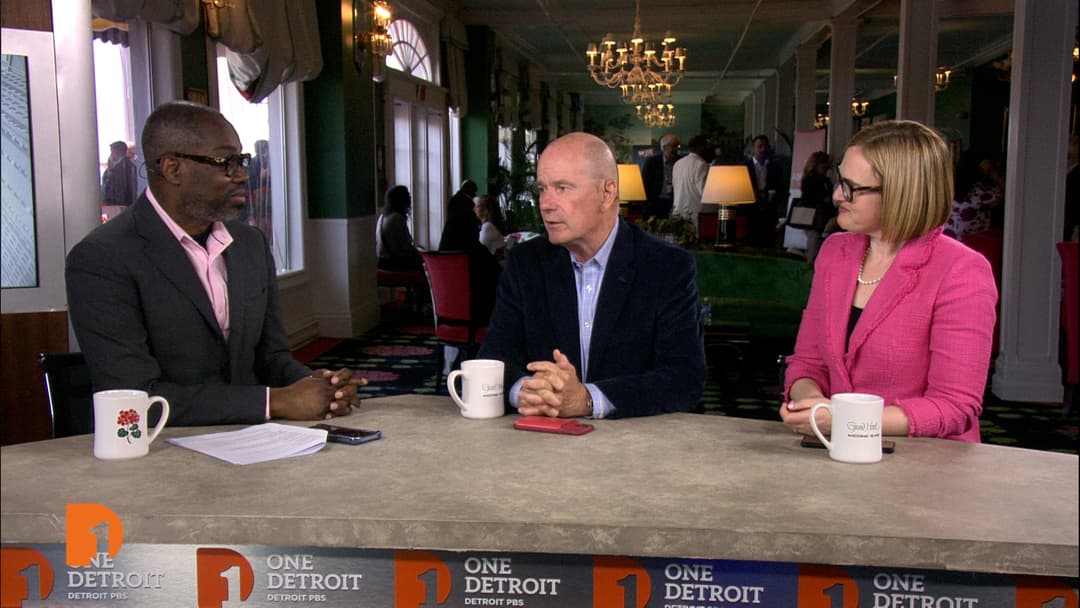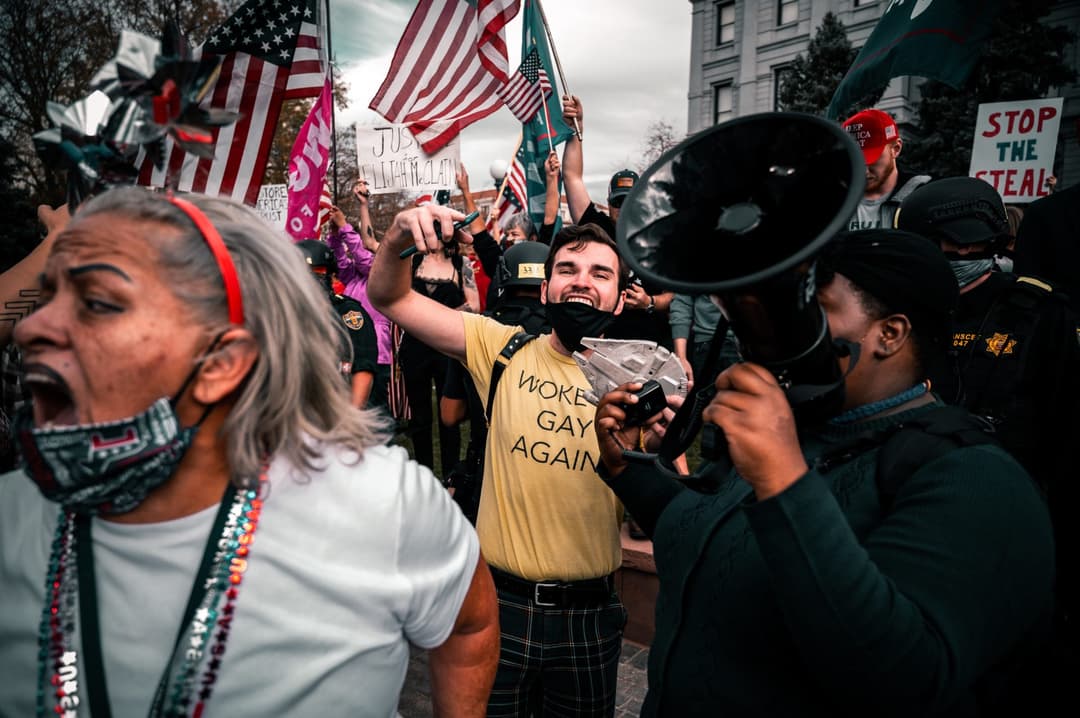
Detroit Civility Project with One Detroit’s Nolan Finley and Stephen Henderson
May 31, 2019
The Detroit Civility Project matched up individuals with different backgrounds, and then had them meet up with one another to learn more about their conversation partner–their values, politics, stories, and more.
[et_pb_video src=”https://www.youtube.com/watch?v=8hU_dTRZfBU” _builder_version=”3.22.4″ z_index_tablet=”500″ /]
Transcript
Christy McDonald: THAT TERM CIVILITY, MUCH TALKED ABOUT THESE DAYS – BUT HOW TO PUT IT INTO PRACTICE?
AT THE DETROIT REGIONAL CHAMBER’S MACKINAC POLICY CONFERENCE, SESSIONS LED BY OUR OWN STEPHEN HENDERSON AND NOLAN FINLEY TRY TO POINT THE WAY.
Stephen Henderson: The sort of key word of this project is the ability to and listen in a way that that really respects what they’re saying as opposed to anticipating what you might say in response, something that’s really hard to do.
THIS IS THE CULMINATION OF THE CHAMBER’S DETROIT CIVILITY PROJECT PAIRING EIGHTY PEOPLE FROM DIFFERING PERSPECTIVES TO JOIN TOGETHER AND TALK – JUST LIKE STEPHEN AND NOLAN – A LIBERAL AND A CONSERVATIVE – DRINKING BUDDIES WHO PARTAKE IN BOURBON, PREFERABLY CRAFTED IN KENTUCKY.
REALLY, THEY’RE FRIENDS – ALTHOUGH IT MIGHT NOT ALWAYS SOUND THAT WAY.
Stephen Henderson (on OD): They were never threatening anyone else!
Christy McDonald (OD): Hang on, hang on one second, hang on one second, stop, hang on one second, stop.
Stephen Henderson (on stage): I’m the first person to say this is not easy. It is not easy to do with Nolan.
Nolan Finley: No. Particularly.
Stephen Henderson (on stage): It is not easy to do with other people with whom I disagree. It has become less easy in the last few years.
Christy McDonald: THE CABLE CHANNELS, ON THE RADIO AND ON-LINE, THE SOCIAL MEDIA AND THOSE FACES, THOSE VOICES – THEY CAN BE TRIGGERING
Terry Bonnette: We get everything from you know, rudeness in the workplace to potential assault to people having violent outbursts.
Christy McDonald: BUSINESSES HIRE DETROIT ATTORNEY TERRY BONNETTE TO FIGHT INCIVILITY IN THE WORKPLACE.
Terry Bonnette: We have a history of case law in Michigan that says you know the workplace is never intended to be an idyllic retreat but at the same time we also have a generation of employees who were raised in which the most important thing that you could do was to reinforce their self-esteem. They’ve never been told, ‘hey it’s my way, you’ve got to do it this way’. And so when you mix that increased sensitivity to conflict with more of a political environment which is additional conflict it creates a bad situation.
Christy McDonald: WE’RE SEARCHING FOR CIVILITY IN THE TIME OF POLARIZATION, AND THEN THERE’S THE POLITICS OF IDENTITY… AND RACE.
Lauren Hood (at event): For a long time there were new people coming to Detroit…
Christy McDonald: LAUREN HOOD LEADS CONVERSATIONS LIKE THIS ONE CALLED “THE BETTER ARGUMENTS PROJECT” –
WHERE LONGTIME DETROITERS COME TOGETHER WITH NEW ARRIVALS.
Lauren Hood: When I’m facilitating conversations on race I always put myself like in the journey also. Like even though I’m a black person, and I’m a person who’s moderated hundreds of people in these conversations, I still know that I have work to do.
Christy McDonald: SOME OF THE CONVERSATIONS FOSTERED BY THE DETROIT CIVILITY PROJECT HAVE TOUCHED ON, WELL, SOME TOUCHY ISSUES.
HERE TA-MUK SCRUGGS AND MADONNA VAN FOSSEN GET TOGETHER.
VAN FOSSEN LIVES IN NORTHERN OAKLAND COUNTY, OMBUDSPERSON FOR SMART TRANSIT SYSTEM BUS RIDERS.
Christy McDonald: DECADES OUT OF HIGH SCHOOL, IN DETROIT SCRUGGS IS A COMMUNITY ACTIVIST AND SAYS HE’S FINALLY FOUND A REAL CAREER AS A SHEET METAL WORKER.
Scruggs: I get that a lot of times, well you know if Detroiters wanted better jobs they should get up and go to school get a better education, go to college, but at the same time it’s really difficult to do that when you have a school system that’s been bankrupt and just people just trying to survive.
Madonna Van Fossen: Right. Our stories are so different but they’re so similar because of the struggles we’ve overcome. My story includes things like divorce, bankruptcy, foreclosure, death, suicide. I was able to, not by myself – God, I’m not going to lie, God’s a big part of my life and support groups and learning how to reach out and ask for help or learning to become part, so when I met you, I got that vibe right away.
Lauren Hood: You’ve got to care about a person who’s impacted by the stuff before you’ll start to shift your consciousness around it.
Christy McDonald: HOOD SAYS THESE KINDS OF CONVERSATIONS CAN BE TOUGH IF THE PARTICIPANTS CAN’T CREATE RELATIONSHIPS.
WHEN THEY DO, IN THE ENCOUNTERS SHE’S LED, SHE’S SEEN REAL BREAKTHROUGHS.
Lauren Hood: There was a white guy in the room who said, like, ‘My dad and my uncle are cops, I don’t understand this poor relationship that black men have with policemen,’ and there were like four other black men in the group who each had you know a story about, a personal story. A nd after that, like, he understood, you could see it in that moment and he had his a-ha moment. He knew them as people first and then heard their stories and was like, ohhhh.
Scruggs: I live in Detroit. It’s bad here every day, but we’re getting better.
Christy McDonald: SCRUGGS AND VAN FOSSEN HAVE MET THE BASIC REQUIREMENTS AS PARTICIPANTS OF THE DETROIT CIVILITY PROJECT – AND NOW THEY HAVE A RELATIONSHIP THAT PROBABLY WOULDN’T HAVE HAPPENED ANY OTHER WAY.
Ta-Muk Scruggs: It was kind of a bonding situation for us because I’ve gone through a lot of transitions myself, got multiple felonies, just growing up in a community where the majority of individuals come from divorced and broken homes, so having to overcome these situations takes a bit of strength and she has gone through her whole set of circumstances and she exhibited that same kind of strength.
Madonna Van Fossen: The chances that I would come down to Detroit and meet someone like Ta-Muk on my own are kind of slim you know it’s just not probably something that would happen, but because of my job and I get to do things like this and now I’ve met him and as a result I’ve been able to connect him with a few things that can help his movements you know, through my job, he’s going to help me out and come speak at a couple different groups that I participate in.
Stephen: We always say, ‘Look, something we’re not going to be able to settle, there’s some that we’ll not be able to agree on, but we’ll keep working at it, and we’ll also leave intact the rest of the relationship, right?
Nolan: We want people to at least respect each other. There’s been so much over the last couple of years—this notion that we can’t talk to each other. And I believe we can talk to each other. I believe we can respect each other. I believe we can learn from each other, even if we never come to agreement.
For more videos on the Civility Project, watch below:
[et_pb_video src=”https://www.youtube.com/watch?v=YNxZQJOG1so” _builder_version=”3.22.4″ z_index_tablet=”500″ /][et_pb_video src=”https://www.youtube.com/watch?v=gw-y5urreUI” _builder_version=”3.22.4″ z_index_tablet=”500″ /]
Learn more about the Detroit Civility Project here ![]()
A Discussion on National Civility with Sandy Baruah, Debbie Dingell, and Fred Upton at the 2019 Mackinac Policy Conference:
[et_pb_video _builder_version=”3.22.4″ src=”https://www.youtube.com/watch?v=idHojnw2MZ8″ z_index_tablet=”500″ /]
Stay Connected
Subscribe to One Detroit’s YouTube Channel and don’t miss One Detroit on Thursdays at 7:30 p.m. and Sundays at 9 a.m. on Detroit PBS, WTVS-Channel 56.
Catch the daily conversations on our website, Facebook, Twitter @OneDetroit_PBS, and Instagram @One.Detroit
Related Posts
Leave a Reply
Your email address will not be published. Required fields are marked*
